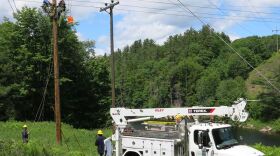Since the inception of the internet and the computer, society has been challenged with balancing technologies’ benefits and demerits.
On June 12, 2017, The Exchange held a discussion on cyberethics. This session discussed crimes captured on video and posted online. The program examined viewers’ and digital platforms’ responsibilities when coming across online crime videos; and how the excitement and potential celebrity status is an incentive for people to perform malicious acts.
This was not the first time The Exchange addressed these topics. Past shows on cybercrime (April 26, 2005) and online bullying (June 2, 2008), give insight that is still relevant to today. These shows illustrate a spectrum of bad behavior on the internet, ranging from petty comments, to murder and abuse posted online. They examined why such misconduct prevailed and what was being done to curb it.
As the 2005 show on cybercrime pointed out, the fact that the internet knows no geographic boundaries makes it harder to report a virtual crime that could have occurred anywhere. This makes it challenging to mitigate such actions.
In 2008, NHPR’s Laura Knoy pointed out that emails had become nastier and that crude comments in blogs and other digital platforms had become the norm. Our guests’ theories on these phenomena are still very relevant to today’s cyber problems.
· The “disinhibition effect.” Psychology and sociology studies suggested that when people are or believe they are anonymous, they will do things they would not do ordinarily.
· Foul behavior has always been a part of society, and that it simply expanded to the internet.
· Conveying tone on the internet is more difficult than in-person communication, leading to misconception.
This “coarsening” of the internet is unlikely to abate, said guest David Weinberger. But the fellow at the Berkman Klein Center for Internet and Society at Harvard University also said “We get used to how to live and navigate in an open world where there are many things that we hate hearing and seeing. But the overall benefit of living together, connected in an open world, we decided, is worth the pain.”







